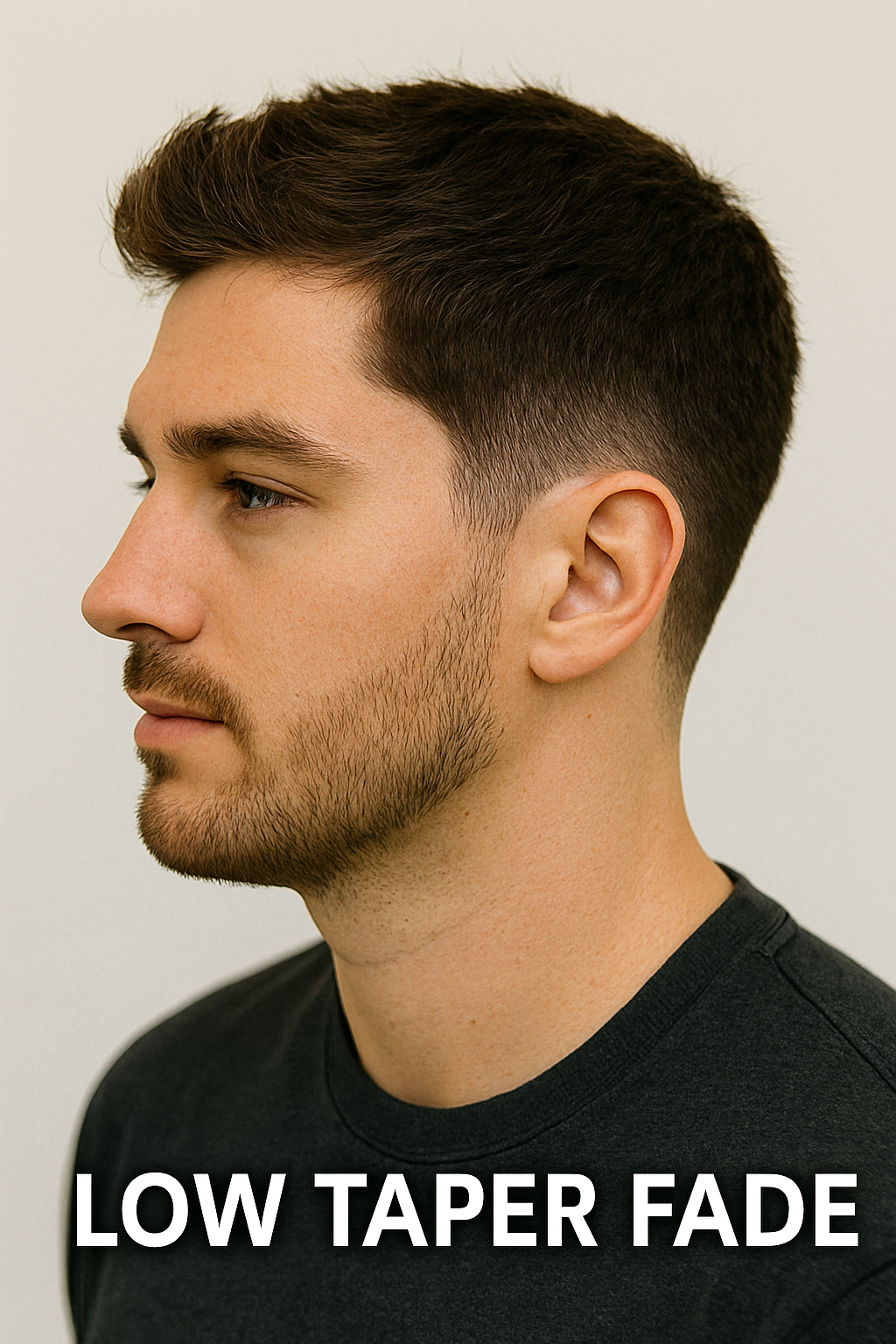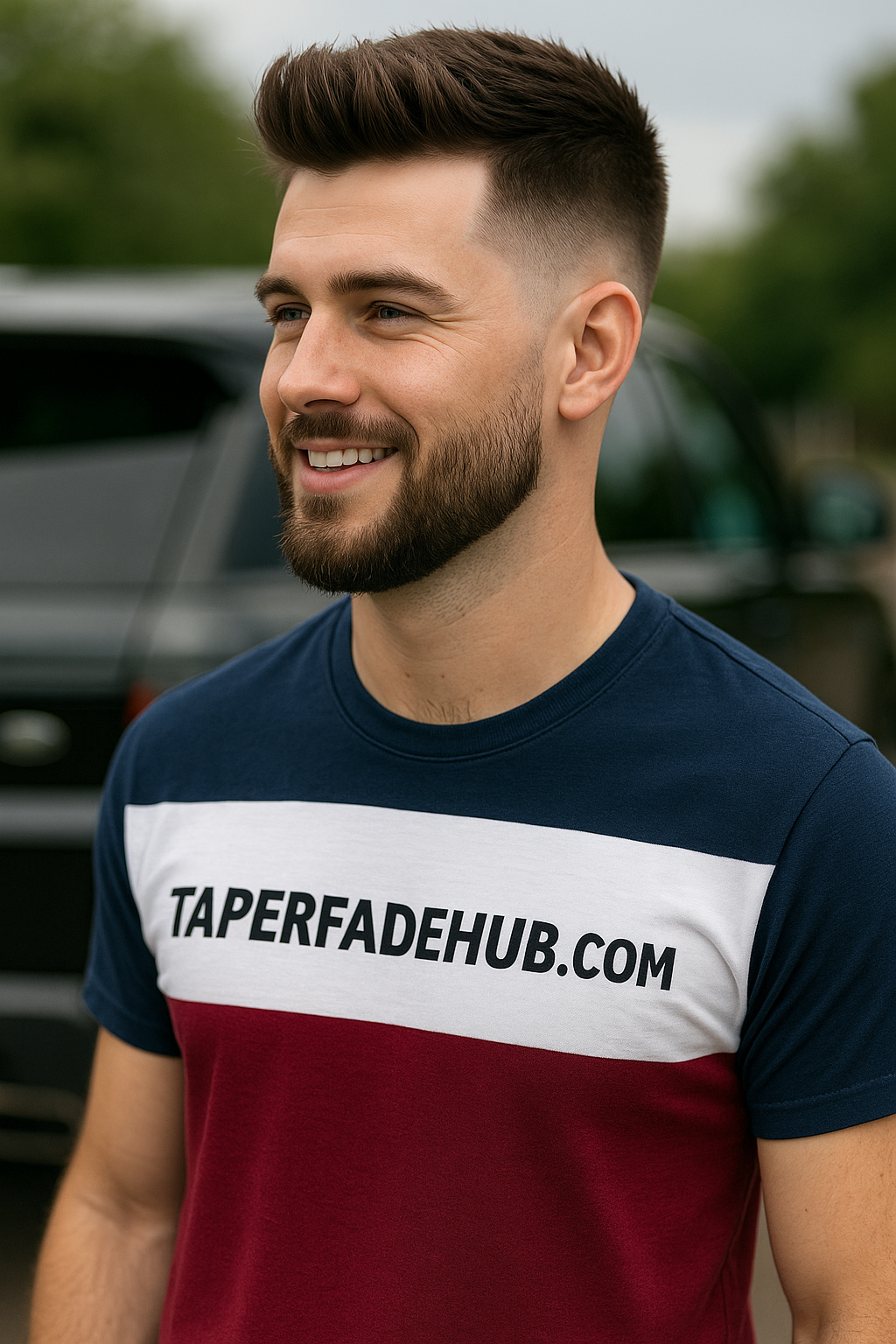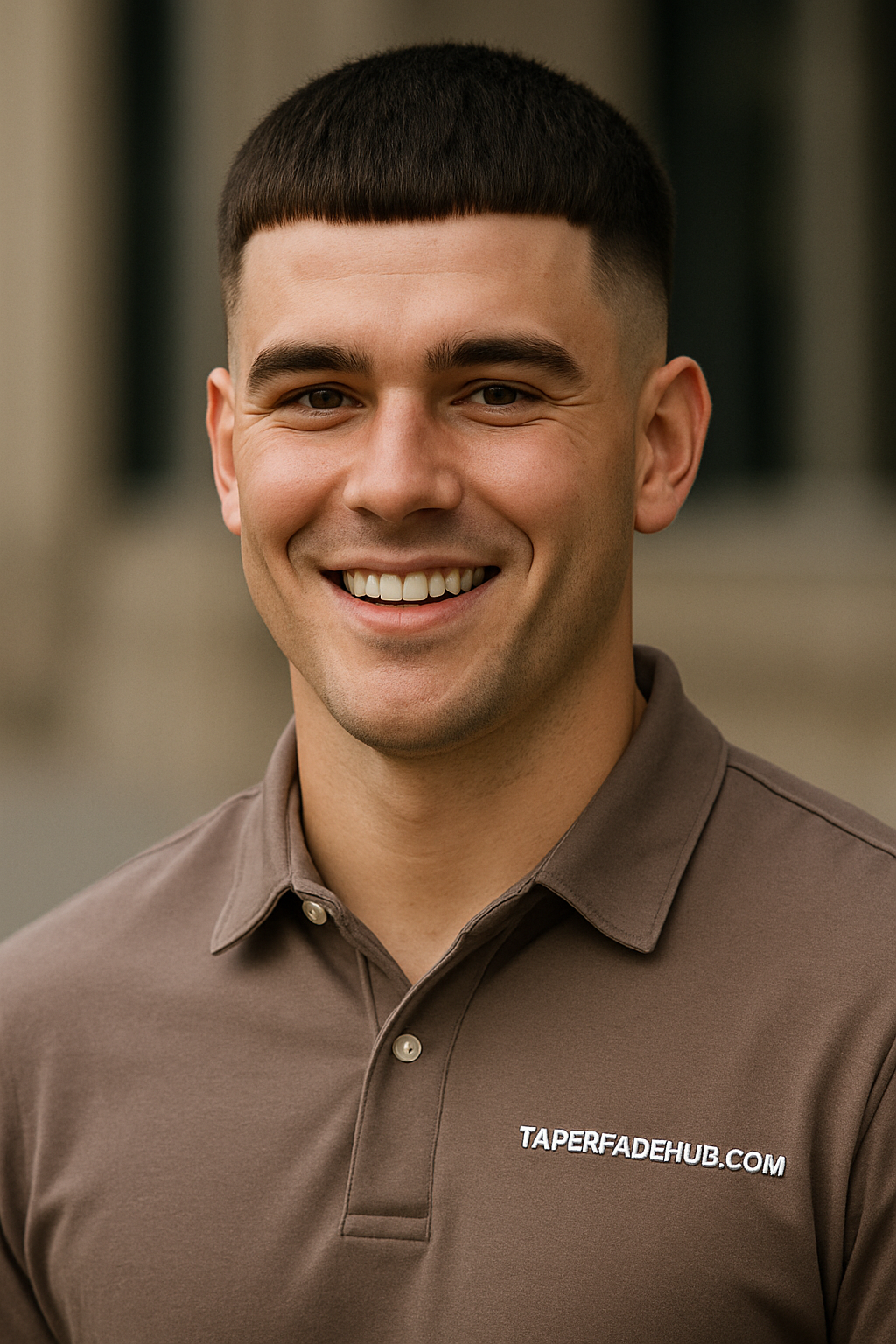What Makes Low Taper Fades So Popular?
The low taper fade has dominated men's grooming trends since 2020, with Google searches increasing 240% according to Google Trends. This versatile cut blends a gradual taper starting just above the ears into longer hair on top, creating a clean yet natural transition that works for professional and casual settings alike.
Unlike high fades that start near the temples, the low fade haircut maintains more hair on the sides while still providing that sharp, polished look. It's particularly flattering for men with round or square face shapes, as the lower fade line helps elongate facial features.
Celebrity influence has propelled this style's popularity, with stars like Michael B. Jordan, Chris Hemsworth, and Timothée Chalamet sporting variations of the look. The American Academy of Dermatology reports that 68% of men now request some form of taper fade during barber visits.
50 Low Taper Fade Variations
1. Classic Low Taper Fade

The timeless version with a clean #1-2 guard fade starting at the ear line. Perfect for corporate environments while maintaining edge. Best for oval and square face shapes.
2. Low Taper Fade with Curly Top

This style keeps curls defined on top while tapering the sides for a fresh silhouette. Works best with medium-length curls and a rounder face.
3. Taper Fade for Straight Hair

Ideal for straighter hair types, this look keeps things sleek with minimal volume and crisp edges. Adds refinement to fine textures.
4. Low Taper Fade with Twists

This cut features defined twisted curls paired with a neat fade around the ears and neckline. A stylish pick for tighter curl patterns.
5. Brushed-Up Low Taper Fade

Volume-focused, this taper keeps sides tight and the top long enough to style upwards. Ideal for straight, thick hair types.
6. Low Taper Fade with Beard Blend

A gradual fade that continues into a well-shaped beard. Great for highlighting jawlines and facial structure.
7. Low Taper Fade with Hard Part

A shaved hard part adds sharp contrast to the soft taper fade. Ideal for formal-meets-modern looks.
8. Temple Low Taper Fade

Keeps the neckline natural while sharply tapering the temple area. Pairs well with longer tops or short curls.
9. Low Taper Fade with Pompadour

This voluminous style elevates the crown while the sides taper low for contrast. Works best with a blow dryer and pomade.
10. Low Taper Fade with Fringe

This cut features short bangs and a low taper that frames the face—great for round or heart-shaped faces.
11. Curly Hair Low Taper Fade

Perfect for naturally curly textures—this taper keeps curls defined on top while trimming excess bulk at the sides.
12. Low Taper Fade with Buzz Cut

Extremely low-maintenance and sharp—combines a uniform buzz cut with slight tapering around ears and neckline.
13. Low Taper Fade with Slick Back

Slicked back with a fade for a clean profile. Great with medium hold gel or pomade for a polished appearance.
14. Low Taper Fade with Afro Top

A rounded, voluminous afro on top contrasts with tight fading on the sides. Great for natural coils and curls.
15. Low Taper Fade with Spiky Texture

Gel-styled or matte-finished spikes on top add energy and edge to the faded sides. Great for a modern, playful vibe.
16. Low Taper Fade with Pompadour

Slicked back high-volume pompadour on top paired with a clean taper at the base. Best for formal and retro-modern looks.
17. Low Taper Fade with Beard

Connects the fade smoothly into a full beard. A strong look for men wanting shape and structure around the jawline.
18. Low Taper Fade with Long Fringe

Textured bangs drape over the forehead while the sides stay clean and faded—perfect for round or triangle face shapes.
19. Taper Fade with Temple Accent

Adds a burst of definition around the temple area while maintaining a subtle taper around the ears and neckline.
20. Faux Hawk with Low Taper Fade

A punk-inspired modern style featuring a central spike with fading down the sides—ideal for high-energy personalities.
21. Low Taper Fade with Afro Top

Keeps the volume and shape of an afro up top while tapering the base and edges for a neater finish.
22. Curly Low Taper Fade with Volume

Enhances your natural curls by tapering the sides and neckline, offering a modern shape with volume on top.
23. Low Taper Fade with Braids

Combines protective braiding styles with clean tapering along the hairline and neckline—great for low-maintenance grooming.
24. Low Taper Fade with Slick Back

Uses pomade or gel for a sleek back comb with short faded sides. Great for professional or evening looks.
25. Low Taper Fade with Middle Part

Clean parted top with tapered sides that frame the face symmetrically—ideal for balanced or heart-shaped faces.
26. Low Taper Fade with Side Swept Bangs

The side bangs fall gently over the forehead, while the taper fade keeps the sides clean and defined.
27. Low Taper Fade with Faux Hawk

Spikes or upward styling on top with a clean fade at the neckline and temple—great for bold, expressive haircuts.
28. Low Taper Fade with Finger Coils

Keeps the curls highly defined on top while blending the taper into the skin at the nape and sides.
29. Low Taper Fade with Temple Line

Accentuates the temples with a defined edge while maintaining a low taper around the ears and back.
30. Textured Crop Low Taper

Choppy, piece-y texture on top with a subtle low taper. Works well with matte products for separation.
31. Low Taper Fade with Blowout

Combines a voluminous blowout on top with a tight taper below—perfect for a bold, high-styled silhouette.
32. Low Taper Fade with Etching

Artistic razor lines or symbols are shaved into the taper area for added flair and personal expression.
33. Low Taper Fade with Waves

The perfect pair for 360 waves—this cut keeps the wave pattern intact while tightening the neckline and sideburns.
34. Low Taper Fade Comb Over

A sleek, gentleman's look featuring a side-swept top and subtle tapering. Great for formal occasions.
35. Low Taper Fade with Undercut

A disconnected undercut with taper fade delivers sharp contrast and definition. Ideal for high-impact styling.
36. Low Taper Fade with Burst Design

A burst fade effect around the ear paired with low tapering creates a dramatic, circular focal point.
37. Skin Low Taper Fade with Razor Line

A bald fade near the neckline, complemented by a razor-sharp line detail—bold and edgy.
38. Low Taper Fade for Receding Hairline

A strategic cut designed to blend into a receding hairline while tapering at the edges for cleaner symmetry.
39. Classic Low Taper with Side Part

A gentleman's favorite—the defined part on one side adds sharpness and style to the classic low taper.
40. Low Taper Fade with Dreads

Ideal for dreadlocks—this fade adds structure to the neckline and temples while keeping length and character up top.
41. Wavy Hair Low Taper Fade with Line-Up

Perfect for wavy textures, this look includes a clean line-up along the forehead for extra shape and structure.
42. Low Taper Fade with Mohawk Accent

An edgy blend of mohawk structure and low taper fade—ideal for bold personalities and high contrast styling.
43. Ivy League Cut with Low Taper Fade

Refined and classic—the Ivy League cut gets a modern boost from a low taper at the sides and back.
44. Low Taper Fade with Drop Shadow Effect

Combines a drop fade along the back curve with low tapering near the ears—great for head shape enhancement.
45. Shaggy Low Taper with Tapered Neck

Casual and textured—this loose shaggy cut is balanced with a subtle taper at the neckline for cleaner finish.
46. Caesar Cut with Low Taper Fade

Short, uniform fringe in the front with neatly tapered sides—this style is low-maintenance and face-framing.
47. Low Taper Fade with Hard Part and Beard Blend

Sharp parting line and a clean beard transition give this style a structured yet masculine finish.
48. Artistic Design Low Taper Fade with Graphics

Turn heads with etched art, swirls, or lines along the fade—great for personal expression and style.
49. Low Taper Fade with Colored Tips

Add personality by dyeing the top hair tips—popular in Gen Z culture and streetwear fashion circles.
50. Low Taper Fade with Quiff and Volume Boost

Big volume in the front styled into a quiff, balanced with tapered sides for a polished yet bold silhouette.
Pro Tip: "Always bring reference photos to your barber," recommends celebrity groomer Lisa Harrison in GQ Magazine. "The term 'low taper fade' means different things to different barbers."
Matching Low Taper Fades to Face Shapes & Hair Types
| Face Shape | Best Low Taper Style | Hair Type | Styling Tip |
|---|---|---|---|
| Round | Textured top with temple fade | Medium density | Add height to elongate face |
| Square | Soft taper with side part | Thick/coarse | Use matte products to soften |
| Oval | Any variation | All types | Experiment with textures |
| Heart | Taper with volume on sides | Fine-medium | Balance narrow chin |
| Diamond | Low skin fade | Curly/coily | Minimize width at cheekbones |
Hair Type Considerations
- Curly hair: Leave at least 3 inches on top for definition
- Coarse hair: Use taper clippers with #1.5 guard
- Fine hair: Add texture powder for volume
- Thinning hair: Avoid contrast with medium fade
- Straight hair: Sharp lines work best
🎧 Audio Guide: Beard Fade Maintenance Tips by Experts
Learn how to keep your beard fade sharp and clean with our step-by-step voice tutorial.
Brought to you by TaperFadeHub.com
How to Get the Perfect Low Taper Fade: Barber's Step-by-Step
Tools Needed:
- Wahl Magic Clip or Andis Master clippers
- #0.5, #1, #1.5, and #2 guards
- Taper lever (adjustable blade)
- Barber comb and scissors
- Edge trimmer for clean lines
Establish Your Baseline
Using your #2 guard, cut all over the sides and back to establish your maximum length. For low tapers, this should be about 1.5 inches above the ear.
Create the Fade Guide
Switch to #1.5 guard and make a horizontal guideline around the head about 1 inch above the ear line. This marks where your fade will transition.
Blend the Transition
Use your taper lever halfway open to blend between the #2 and #1.5 sections. Move the clipper in small circular motions for seamless graduation.
Refine with Detail Work
Switch to your edge trimmer to clean up around the ears, neckline, and sideburns. Use a razor for precise lines if doing a hard part.
Style the Top
Cut the top according to your preferred length (scissors or clipper comb). For textured looks, point cut the ends rather than blunt cutting.
Watch professional barber demonstrate a perfect low taper fade technique from start to finish.
Low Taper Fade Maintenance Guide
Frequency of Cuts
- Sharp look: Every 2 weeks
- Casual style: Every 3-4 weeks
- Budget option: Every 5 weeks with at-home touch-ups
According to a 2024 Men's Journal survey, 72% of men maintaining fades visit their barber every 14-18 days.
Do's
- Use sulfate-free shampoo to prevent dryness
- Moisturize faded areas daily
- Sleep on silk pillowcases to reduce friction
- Use a boar bristle brush for natural oils
- Apply sunscreen to exposed scalp
Don'ts
- Overwash (strips natural oils)
- Use heavy pomades on fine hair
- Cut against the grain when DIY trimming
- Neglect neckline between cuts
- Use dull clipper blades
At-Home Touch-Up Kit
Extend your fade between barber visits with these essentials:
- Wahl Detailer Li trimmer ($40)
- Andis T-Outliner trimmer ($60)
- Ceramic blade oil ($8)
- Anti-irritation aftershave ($15)
- Handheld mirror ($12)
Low Taper vs Other Fade Styles
| Style | Fade Start Point | Maintenance | Best For |
|---|---|---|---|
| Low Taper | Above ears | Every 2-3 weeks | Professional settings |
| Mid Taper | Temple area | Every 10-14 days | Round face shapes |
| High Taper | Near parietal ridge | Weekly | Dramatic contrast |
| Drop Taper | Dips behind ear | Every 2 weeks | Square jaws |
| Skin Taper | Varies | Every 7-10 days | Sharp contrast |
Pro Tip
"Low tapers grow out more gracefully than high fades," notes barber educator Carlos Rivera. "You get an extra week before it looks messy, making it ideal for busy professionals."
Barber Expert Tips for Perfect Low Taper Fades

David Chen
Andis Educator
"Always taper the back first before moving to the sides. The nape area shows grow-out fastest, so give it the most attention."

Maria Gonzalez
Wahl Academy
"For curly hair, use clipper-over-comb technique instead of guards to prevent uneven results from hair springing up."

Tyler James
Celebrity Barber
"The magic happens in the blending zone. Spend 70% of your time on the 1-inch transition area between faded and longer sections."

Lee Thompson
Fade Specialist
"Use your non-dominant hand to stretch the skin taut when doing the hairline - this prevents uneven lines from natural head movement."
📊 Industry Insights
According to the 2025 American Academy of Dermatology report:
- Low taper fades account for 38% of men's haircut requests
- 72% of clients report easier maintenance than high fades
- Barbers complete 22% more low fade appointments daily compared to skin fades
Low Taper Fade FAQs
Use this phrasing: "I'd like a low taper fade starting about an inch above my ears, blended into [X length] on top." Specify if you want it: "With a hard part," "Temple faded," or "Textured on top." Bring reference photos showing both front and side views of your desired style.
Most low taper fades maintain a sharp look for 12-16 days. The grow-out becomes noticeable when: 1) The faded area reaches 1/4 inch length, 2) The neckline becomes fuzzy, or 3) The contrast between top and sides diminishes. Darker hair shows grow-out faster than lighter shades.
Yes, but with modifications: 1. Keep the fade higher (mid instead of low) to balance proportions, 2. Avoid sharp contrast between top and sides, 3. Leave more length on top (minimum 2 inches), and 4. Consider a messy textured top to distract from thinning areas. The American Hair Loss Association recommends matte products over shiny pomades for thinning hair.
A regular taper gradually shortens hair length from top to bottom without creating the dramatic contrast of a fade. Taper fades specifically: 1. Start the shortening higher on the head, 2. Use clipper guards for precise length transitions, and 3. Often incorporate skin or near-skin lengths at the bottom. Regular tapers are more subtle for conservative workplaces.
Industry standard is 15-20% of the service cost. For exceptional fades: 1. Tip 25% for perfect symmetry, 2. Add $5-10 for intricate designs, and 3. Consider holiday bonuses for your regular barber. According to Square's 2024 data, the average fade haircut tip is $7.82 nationally.
Essential Grooming Products for Low Taper Fades

Wahl Magic Clip Cordless
#1 barber-recommended clipper
Self-sharpening blades stay crisp for 500+ cuts. The adjustable taper lever makes fade blending effortless.
Buy Now →
Andis T-Outliner
Sharpest detailing trimmer
Cuts hair closest to the skin without irritation. Essential for crisp hairlines and beard edges.
Buy Now →
Hanz de Fuko Claymation
Best texture for faded styles
Provides flexible hold without shine. Works for all hair types from fine to coarse. Perfect for men.
Buy Now →
American Crew Fiber
Classic matte finish
Affordable staple for textured looks. Provides medium hold with natural appearance.
Buy Now →Complete Fade Maintenance Kit
For professional results at home, we recommend these additional items:
- Ceramic blade oil: Extends clipper life 3x
- Anti-fade shampoo: Prevents color loss on dark hair
- Boar bristle brush: Distributes natural oils evenly
- Microfiber towel: Reduces frizz when drying
- Scalp moisturizer: Prevents irritation from frequent fading
More Taper Fade Resources
Mid Taper Fades for Curly Hair: 25 Styles to Try
Professional techniques for maintaining curly textures with sharp fades
Read Guide →Low Taper Fades for Straight Hair: Barber's Maintenance Guide
How to style and maintain dramatic contrast fades
Read Guide →Temple Fade vs Taper Fade: Key Differences Explained
Barber's breakdown of these often confused styles
Read Guide →Taper Fade Maintenance Schedule: How Often to Cut
Professional timeline for keeping your fade looking fresh
Read Guide →Free Barber-Approved Guide
Download our "Low Taper Fade Maintenance Routine" PDF with step-by-step photos and product recommendations.
Download Free PDFIncludes cutting diagrams and grow-out timelines
Find Barbers In Your City
Browse by state, city, and neighborhood
The Ultimate Barber Glossary
Master professional haircutting terminology with our comprehensive guide to barbering terms and techniques.
Haircut Styles
Learn the differences between popular styles like high top fades, pompadours, and undercut hairstyles.
- Bald fade vs. skin fade differences
- Crew cut vs. Ivy League comparison
Cutting Techniques
Professional methods like scissor-over-comb, razor cutting, and dry cutting explained.
- How to ask for a taper haircut
- Texturizing vs. layering differences
Tools & Products
Essential barber tools and styling products compared for optimal results.
- Best clippers for professional fades
- Pomade vs. wax vs. gel comparison
Final Barber Verdict
The low taper fade remains the most versatile men's haircut of 2025, offering the perfect balance between professional polish and modern edge. Its growing popularity stems from three key factors: 1) Flattering on nearly all face shapes, 2) Easier maintenance than high fades, and 3) Seamless transition between formal and casual settings.
For first-timers, start with a classic #2 guard low fade before experimenting with more dramatic variations. Remember that your ideal fade depends on hair type, face shape, and lifestyle needs. Consult with an experienced barber and use the reference photos in this guide to communicate your vision clearly.
With proper maintenance using the recommended products and techniques, you can keep your low taper fade looking fresh for weeks between cuts. This timeless style continues evolving while maintaining its status as the gold standard in men's grooming.
Honoring Marcus T. Johnson for Grooming Education Excellence

Our Lead Barber and Content Director, Marcus T. Johnson, has been awarded the prestigious 2025 Barbering Excellence Award for his impactful contributions to modern grooming education.
Through his dedication to elevating the taper fade craft—from step-by-step tutorials to tool breakdowns—Marcus has helped thousands master at-home barbering with confidence. His leadership at TaperFadeHub.com continues to shape the future of digital barbering.
Read All Articles →Glossary: Barbering Terms You Should Know
Parietal Ridge
The widest part of the head where it begins to curve away from the sides. It’s a key landmark when blending fades and determining transition zones.
Clipper Guards
Detachable plastic or metal attachments that control the length of hair being cut. Typically numbered from 0 to 8, higher numbers leave more hair.
Blending Zone
The 1–2 inch area where short and long sections of a fade meet. Master barbers spend the most time here to ensure a seamless gradient.
